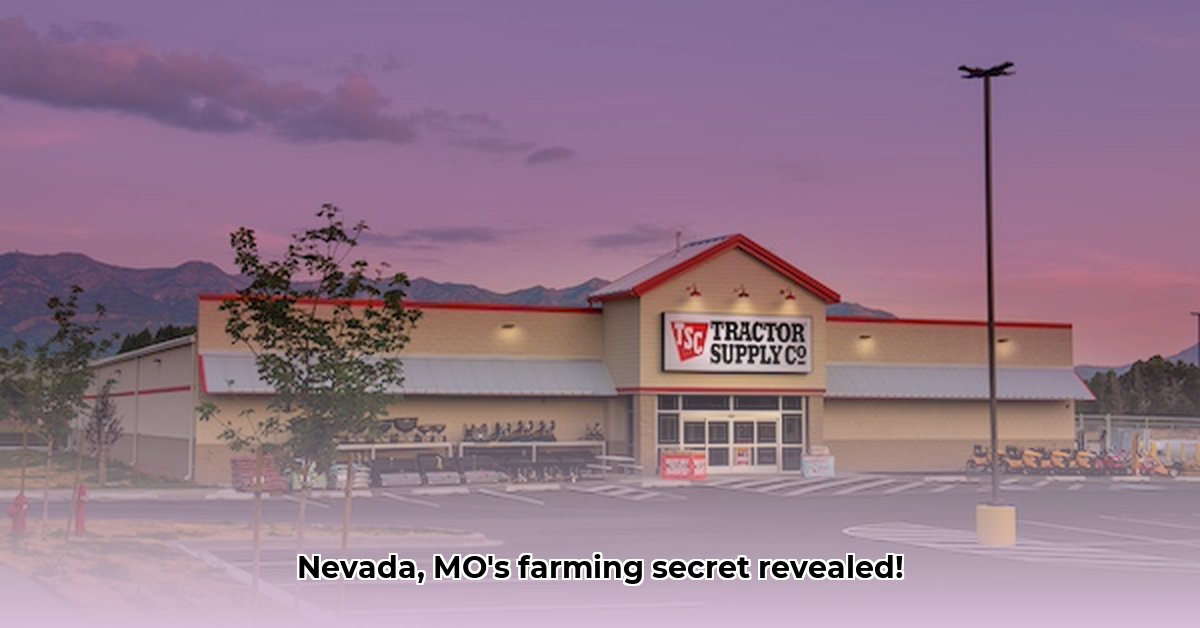
Tractor Supply Company (TSC) plays a significant role in the agricultural landscape of Nevada, Missouri, providing essential supplies and services to local farmers. However, its contribution to truly sustainable farming practices presents a more complex picture. While TSC offers various products applicable to sustainable methods, its overall impact requires a nuanced evaluation, considering both its strengths and limitations. For more information on TSC's local presence, see this page.
TSC's Supply Chain: A Foundation for Farming
TSC serves as a vital link in the agricultural supply chain, readily providing farmers with essential goods, from seeds and fertilizers to tools and fencing. This readily accessible supply of resources is crucial for maintaining farm operations and ensuring consistent food production in rural Nevada. This readily available access directly supports the economic viability of farms and indirectly enhances the overall health of the local agricultural sector. But is this enough to claim TSC is actively promoting sustainability? The answer is not straightforward.
The Sustainability Gap: Transparency and Action
A significant challenge in assessing TSC’s role in sustainable agriculture is the lack of publicly available data regarding the company's own environmental footprint. Their website lacks detailed information on supply chain practices, energy consumption, and waste management strategies. This lack of transparency hampers a complete evaluation of their overall environmental impact. How can we assess their contribution to sustainability without a clear understanding of their own sustainability initiatives? This is a crucial question that requires immediate attention.
Bridging the Gap: A Multi-faceted Approach
To fully understand and improve TSC’s contribution towards sustainable farming in Nevada, a multi-pronged approach is necessary:
Enhanced Transparency from TSC: The company should conduct and publicly release a comprehensive environmental audit detailing its supply chain practices, energy use, and waste reduction efforts. This transparency is fundamental to gaining a true understanding of TSC’s overall environmental impact.
Strategic Resource Allocation by Farmers: Farmers can leverage TSC’s resources more effectively by prioritizing sustainable products such as cover crops (which help prevent soil erosion and improve soil health), and adopting water conservation techniques. This requires both awareness and informed decision-making on the part of Missouri farmers.
Consumer-Driven Demand for Sustainability: Consumers can actively support businesses prioritizing sustainable practices, thereby creating market demand for environmentally friendly products. This consumer-driven demand will pressure companies like TSC to prioritize sustainability in their product offerings and business practices.
Governmental Support and Collaboration: Governmental agencies can incentivize sustainable farming practices through financial incentives and policies, promoting collaboration between TSC and farmers to integrate sustainable methods and technologies into everyday farming practices.
Assessing the Risks: A Realistic Perspective
TSC, like any business, faces various risks affecting its operations and its ability to support sustainable practices:
| Risk Factor | Probability | Impact | Mitigation Strategies |
|---|---|---|---|
| Supply Chain Disruptions | Medium | High | Diversify suppliers, develop strong supplier relationships |
| Shifting Consumer Demands | Medium | Medium | Expand sustainable product offerings |
| Lack of Transparency on Sustainability | High | Medium | Conduct and publicize comprehensive environmental audits |
| Competition from Online Retailers | High | Medium | Enhance online presence and customer service |
| Stricter Environmental Regulations | Low | High | Proactive compliance, invest in environmentally friendly technologies |
These potential risks underscore the importance of proactive planning and adaptation in the face of changing environmental concerns and market demands.
Conclusion: Towards a Sustainable Future
Tractor Supply Company plays a crucial role in Missouri's agricultural sector, providing essential resources to farmers. However, its full potential toward supporting sustainable farming practices hinges on increased transparency, collaborative partnerships, and a proactive approach from the company, farmers, consumers, and the government. The information presented here calls for further investigation into TSC’s complete environmental impact to create a truly sustainable and prosperous agricultural future for Nevada, Missouri. Only through joint action can we unlock the potential for a greener future.